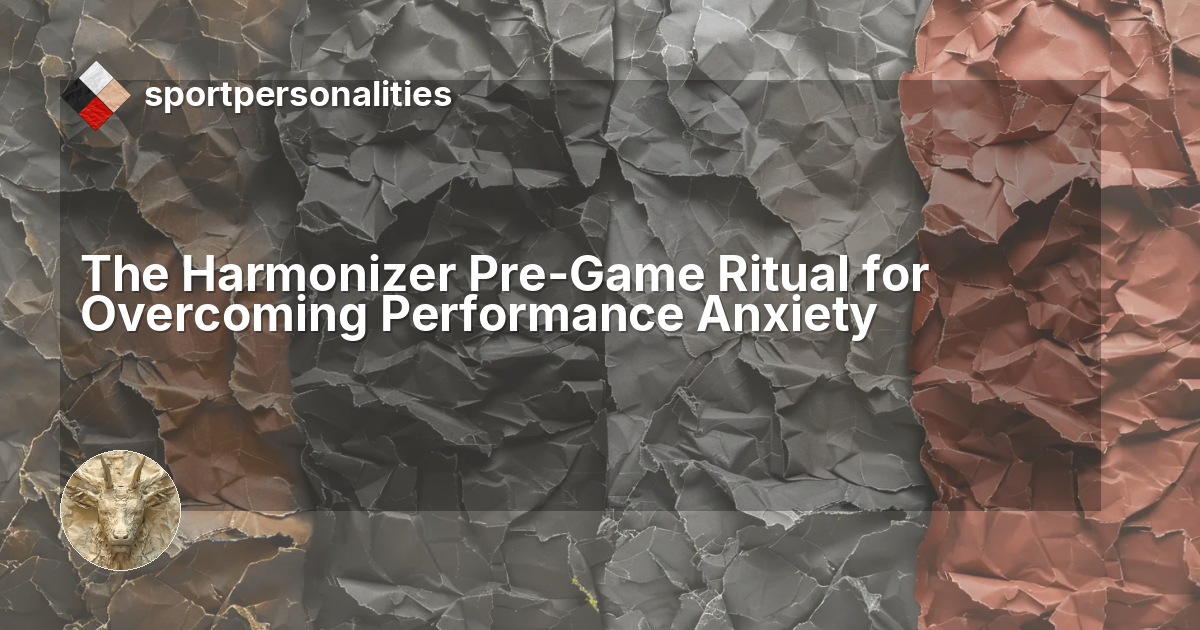 The Harmonizer (ISRC)'s Pre-Game Ritual: Building Calm Through Connection Instead of Isolation
The Harmonizer (ISRC)'s Pre-Game Ritual: Building Calm Through Connection Instead of Isolation
Most athletes retreat inward before competition. They slip on noise-canceling headphones, find quiet corners, and build walls between themselves and the world. But The Harmonizer takes a different path. While others isolate, they connect. Where teammates withdraw, they reach out. This approach might seem counterintuitive, but for this sport personality type, calm comes through community, not solitude.
The Harmonizer's pre-game psychology runs counter to conventional athletic wisdom. They don't need silence to find focus. They find it through meaningful exchanges with teammates, coaches, and even opponents. Their nervous energy transforms into positive momentum when filtered through genuine human connection.
Understanding this difference matters because it challenges how we think about pre-game preparation. For The Harmonizer, the ritual isn't about shutting out the world. It's about tuning into it more deeply.
Why Connection Calms The Harmonizer
Think of a basketball player who embodies The Harmonizer sport profile. Two hours before tip-off, while teammates are sprawled across locker room benches with eyes closed and music blasting, this player moves through the space differently. They check in with the rookie who looks nervous. They share a quiet word with the veteran dealing with a nagging injury. They ask the equipment manager about his daughter's soccer game.
These aren't distractions from preparation. They are the preparation. Each connection grounds them further in the present moment. Each genuine interaction builds their sense of belonging and purpose. The Harmonizer draws strength from the web of relationships around them, and pre-game time becomes an opportunity to strengthen those bonds.
Research from sports psychology supports what these athletes already know. While some athletes perform best when their arousal levels drop through isolation and meditation, The Harmonizer's nervous system actually regulates better through positive social interaction. Their stress hormones decrease when they engage in supportive conversations. Their confidence builds as they remind themselves they're part of something larger.
Here's what this looks like on actual teams. The Harmonizer might be the player who initiates the pre-game huddle that goes beyond X's and O's. They're talking about trust, about having each other's backs, about the joy of competing together. While other personality types might find this energy-draining, The Harmonizer feeds off it.
The Harmonizer's Connection-Based Rituals
The most effective pre-game rituals for The Harmonizer revolve around intentional relationship building. These aren't random social interactions or nervous chatter but purposeful moments of connection that serve specific psychological functions.
- The gratitude check-in works incredibly well. Thirty minutes before competition, The Harmonizer might spend five minutes expressing genuine appreciation to teammates, coaches, or support staff. This isn't about pumping up the team with rah-rah energy. It's about acknowledging the people who make their athletic journey possible. The act of giving gratitude actually receives focus and emotional balance in return.
- Another common ritual involves what we might call "competitive empathy." The Harmonizer takes time to genuinely consider their opponents not as enemies to defeat, but as fellow athletes pursuing excellence. They might visualize respectful competition rather than domination. This perspective shift reduces anxiety because it frames the upcoming contest as a shared pursuit of excellence rather than a zero-sum battle.
- The wisdom-seeking conversation also serves The Harmonizer well. They might approach a coach or veteran teammate with a specific question about strategy or mindset. The content of the answer matters less than the process of seeking guidance and feeling connected to experienced voices. This ritual reinforces their sense of belonging within a learning community.
- Physical connection rituals work too. The Harmonizer might be the player who initiates the elaborate handshake sequence or the group stretch that becomes more about synchronized breathing than flexibility. These shared physical experiences create a sense of unity that translates into competitive confidence.
When Connection Rituals Go Wrong
The Harmonizer's connection-based approach can backfire in certain environments. When teammates are locked into their own isolation rituals, attempts at connection might feel forced or unwelcome. A golf team where every player needs complete silence might leave The Harmonizer feeling disconnected and anxious.
Timing becomes crucial. The Harmonizer who tries to engage in deep conversations five minutes before taking the field might overwhelm teammates who need those final moments for individual mental preparation. Learning to read the room and adjust their connection-seeking behavior becomes a skill in itself.
There's also the trap of becoming the team's emotional caretaker. The Harmonizer might spend so much pre-game energy supporting others that they neglect their own mental preparation. They end up managing everyone else's anxiety while ignoring their own.
But here's the catch - you need boundaries. The Harmonizer needs to identify which connections serve their preparation and which ones drain their energy. Not every conversation needs to happen. Not every teammate needs their attention. The athletes who master this approach trust their gut about which pre-game connections will help them perform.
Discover Your Sport Personality
This article explores one of 16 profiles. Find out which one you are and unlock a personalized blueprint for your athletic journey.
Take the Free TestAdapting Connection Rituals to Different Sports
- Individual sports require The Harmonizer to get creative about connection rituals. A tennis player might spend time before a match connecting with their coach about strategy, but also about life beyond tennis. They might text family members or call a mentor. The connection doesn't have to be physically present to be meaningful.
- Endurance athletes face unique challenges. A marathon runner who embodies The Harmonizer might struggle with the solitary nature of long training runs. Their pre-race ritual might involve connecting with other runners at the starting line, sharing stories and encouragement. They might volunteer at races during their off-season, building relationships within the running community that pay dividends on race day.
- Combat sports present another interesting case. A boxer or martial artist who is The Harmonizer might seem contradictory, but they often approach competition as a respectful dialogue between skilled practitioners rather than a violent confrontation. Their pre-fight ritual might include meditation on their opponent's skill level and acknowledgment of the shared risks they're both taking.
- Team sport Harmonizers have more obvious opportunities for connection, but they still need to be strategic. A soccer midfielder might use pre-game warm-ups as chances for brief, meaningful exchanges with each teammate. A volleyball setter might take time to sync up with each hitter, not just about tactics but about confidence and trust.
Building Your Connection-Based Pre-Game Ritual
The Harmonizer who wants to develop more effective pre-game rituals should start by auditing their current patterns. Which pre-competition interactions leave them feeling energized versus drained? Which conversations increase their confidence versus their anxiety? Which connections remind them of their purpose versus distract from their goals?
The next step involves intentional design. Rather than random social interaction, The Harmonizer can plan specific connection points. They might schedule a phone call with a mentor two hours before competition. They might identify three teammates to check in with during warm-ups. They might plan to express gratitude to one person who has supported their athletic journey.
Practice matters here too. Connection rituals need rehearsal just like physical skills. The Harmonizer can experiment with different approaches during practice sessions or smaller competitions. They can learn what types of conversations serve them best at different time points before competition.
Most importantly, The Harmonizer needs to own their unique approach. In a sports culture that often glorifies lone wolf mentality and individual toughness, their connection-based rituals might seem soft or unfocused to others. But for this sport profile, relationship and performance aren't separate things. They're two sides of the same coin - performing well means connecting well.
The Harmonizer who trusts their instincts about pre-game preparation will find success, even when those instincts run counter to conventional wisdom. They find calm through connection because that's how they're wired. Their pre-game ritual isn't about becoming someone else. It's about becoming more fully themselves.
This content is for educational purposes, drawing on sport psychology research and professional experience. I hold an M.A. in Social Psychology, an ISSA Elite Trainer and Nutrition certification, and completed professional training in Sport Psychology for Athlete Development through the Barcelona Innovation Hub. I am not a licensed clinical psychologist or medical doctor. Individual results may vary. For clinical or medical concerns, please consult a licensed healthcare professional.




